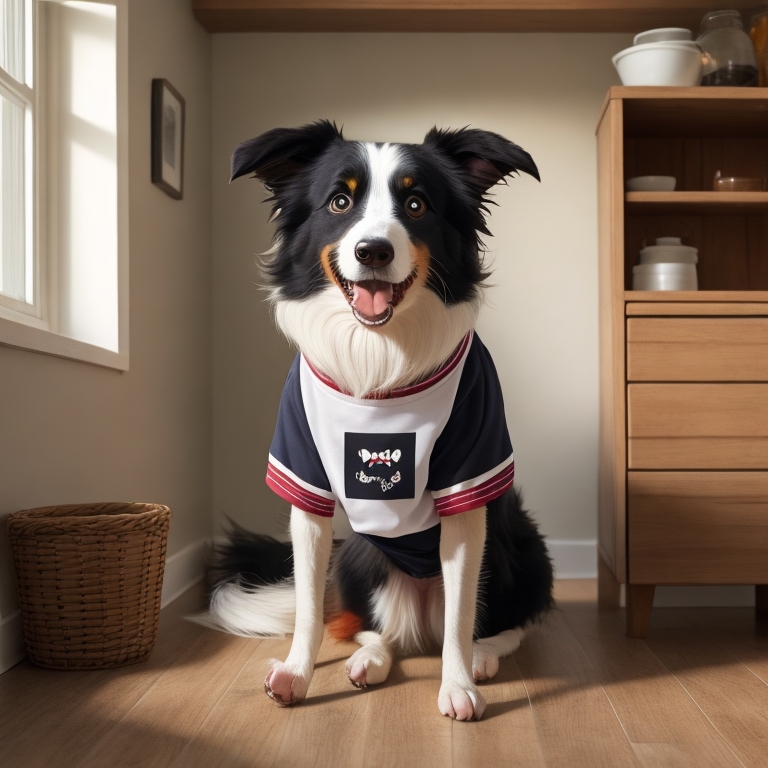Can Border Collies Be Trained For Therapy Work?
Are you looking for a unique and intelligent therapy dog? Look no further than the beloved Border Collie breed.
Highly skilled, intelligent, and energetic, they make excellent therapy dogs if trained correctly.
This begs the question, can Border Collies be trained for therapy work? The answer is a resounding yes! Join me as we explore the qualities that make Border Collies exceptional therapy dogs, the necessary training considerations, and the various instances where they can excel as therapy dogs.
Let’s dive in and find out why Border Collies make excellent therapy dogs.
| Criteria | Yes | No |
|---|---|---|
| Disposition | Friendly and gentle | Aggressive or fearful |
| Temperament | Intelligent and trainable | Stubborn or difficult to train |
| Size | Medium-sized | Not suitable for all therapy settings |
| Energy level | Highly energetic | May need to be exercised often |
| Coat type | Low-shedding | May not be suitable for individuals with allergies |
The Qualities of Border Collies that make them Therapy Dog Candidates
Temperament
When it comes to the temperament of Border Collies, they are known to be highly intelligent, loyal, and obedient dogs. These traits make them great candidates for therapy dog work, as they can easily connect and bond with people.
They are also highly sensitive to their surroundings and can easily pick up on people’s emotions, making them great companions for those in need of emotional support.
However, it’s important to note that Border Collies also have a high energy level, which must be taken into consideration during training and therapy work. Overall, Border Collies’ strong temperament makes them well-suited for therapy work, but it’s important to understand and manage their energy levels appropriately.

Intelligence and Trainability
Border Collies are renowned for their intelligence and trainability, making them suitable candidates for therapy dog work. They are highly responsive to training, which can help them learn new commands quickly and develop into well-behaved dogs.
With their intellect and keen observance, they are highly adaptable to different situations, making them ideal for therapy work.
When it comes to training, Border Collies are an easy breed to work with. They are known to excel in obedience training, and positive reinforcement techniques are especially effective.
As natural learners, they thrive on new challenges and tasks, which means trainers can always find ways to teach them new things.
While their high intelligence levels can make them easy to train, this mental capacity can have its drawbacks. When unoccupied, Border Collies can become restless easily, leading to situations of getting into trouble.
Therefore, it’s crucial to keep them occupied with sufficient mental and physical activity.
In summary, the Border Collie’s intelligence and trainability make them excellent candidates for therapy dog work. With their natural aptitude to learn, positive reinforcement techniques can be employed to shape their behavior.
To keep them happy and well-behaved, they require sufficient mental and physical activity.
Energy Levels
Border Collies are known for their high energy levels, and this is one of the qualities that make them great candidates for therapy dog work. Energy levels vary from dog to dog, but Border Collies generally have a lot of energy to burn.
This high energy level means they can be trained to work for extended periods without getting tired or losing interest.
Border Collies can keep up with busy schedules and shifts that therapy work demands. However, it’s important to note that their high energy levels require proper exercise and activities to prevent them from getting destructive and developing behavioral problems.

Physical Attributes
Border Collies have distinct physical attributes that make them an ideal candidate for therapy work. They have a medium-sized body, usually weighing between 30-45 pounds and standing 18-22 inches tall.
Their coat is a double layer, either smooth or rough, and can be various colors such as black, white, or red.
One of their notable physical attributes is their high energy level. Border Collies possess great stamina and require significant amounts of exercise daily.
This makes them a great dog for therapy work as they can keep up with long sessions and interact with people of all ages.
Along with their energy, Border Collies are agile and athletic with impressive speed and agility. This attribute helps them navigate through crowds and access difficult-to-reach areas with ease during therapy sessions.
Furthermore, Border Collies have expressive and engaging eyes that help them connect with people.
They can communicate with their eyes, which can be especially helpful for therapy sessions with non-verbal patients. Overall, Border Collies’ unique physical attributes make them suitable for therapy work.
Their high energy levels, agility, and expressive eyes benefit them during therapy sessions.
Special Skills and Abilities
Border collies possess several special skills and abilities that make them ideal candidates for therapy work. Firstly, they have an extraordinary ability to read human body language and respond accordingly, making them adept at comforting people in distress.
Secondly, their boundless energy levels mean they can keep up with the demands of therapy work.
Moreover, these dogs are highly obedient and can quickly pick up new commands, making them easy to train for specific therapy tasks. They also have sharp problem-solving skills, making them great at adapting to new situations and environments.
Lastly, Border collies have a unique drive to please their owners and loves ones, which can be harnessed to diligently perform their therapy duties with zeal.
Important Training Considerations for Border Collies as Potential Therapy Dogs
Socialization
Socialization is an essential aspect of training a Border Collie for therapy work. It involves introducing them to various people, animals, places, and situations to help them become comfortable and confident in different environments.
Early, positive socialization sets the foundation for a well-adjusted therapy dog.
As a therapy dog, a Border Collie will encounter numerous people with different personalities, needs, and behavior. Thus, it is crucial to expose them to various stimuli early during the socialization process.
Training your Border Collie with humane and positive methods is essential to achieve optimal socialization.
A well-socialized therapy dog can interact positively with strangers, children, the elderly, and other animals. Socialization should continue throughout the life of your Border Collie.
Frequent exposure to different environments and people is necessary to maintain positive behavior.
A well-socialized therapy dog is always friendly and comfortable in different social settings. Socialization is a fundamental aspect of training a Border Collie for therapy work.
Proper socialization should begin early in the dog’s life, and it should be done using positive reinforcement methods.
The socialization process is ongoing and should be maintained throughout the dog’s life. A well-socialized Border Collie is an ideal candidate for therapy dog work.

Obedience Training
Obedience training is a crucial aspect of preparing a Border Collie to become a successful therapy dog. Training techniques should focus on helping your dog remain focused, calm, and obedient in various situations.
Basic commands such as “sit,” “stay,” and “come” are vital for controlling your dog’s behavior.
Training sessions should be kept short and frequent, with positive reinforcement used to reward desired behavior. Consistency is key, and training should take place in various environments to help your dog learn to navigate different settings.
It is important to remember that obedience training is not a one-time event; it is an ongoing process.
As a therapy dog, your Border Collie will be exposed to new people and surroundings regularly. Therefore, they must be able to adhere to commands even in unfamiliar environments.
Seeking professional help from an experienced dog trainer is recommended, especially for first-time dog owners.
They can provide specialized training to help your Border Collie become a confident and effective therapy dog.

Training for Specific Therapy Work
When it comes to training Border Collies for therapy work, there are some specific considerations to keep in mind. These dogs require specialized training to become effective therapy dogs.
One essential aspect of training for specific therapy work is socialization.
It’s critical to expose the dog to all sorts of situations and people to help them become comfortable and well-adjusted in different environments. Obedience training is also crucial for therapy dogs.
They need to be able to follow commands and behave appropriately in all situations, especially when interacting with patients.
Furthermore, it’s necessary to provide training specifically geared towards the kind of therapy work the dog will be doing. For example, if the dog will be working with children, specialized training on how to interact with kids would be necessary.
Continuous learning is also vital for therapy dogs.
Dogs that receive regular training and enrichment activities are more likely to remain engaged and enthusiastic about their work with patients. In summary, training for specific therapy work is essential for Border Collies to become effective therapy dogs.
Socialization, obedience training, specialized therapy training, and continuous learning all play important roles in developing a successful therapy dog.
Continuous Learning
Continual learning is crucial for any potential therapy dog, and Border Collies are no exception. As highly intelligent animals, they thrive on new challenges and cognitive engagement.
To prepare a Border Collie for therapy work, you must prioritize continuous learning through various activities, such as obedience training, agility training, and even scent-detection training.
Consistent training will both facilitate your Border Collie’s mental development and prepare them for the unique demands of therapy work. To ensure success as a therapy dog, it is necessary to make learning a part of their daily routine.

Instances where Border Collies can be used as Therapy Dogs
Hospitals and Healthcare Facilities
Border Collies have proven to be excellent therapy dogs, and one area where they excel is in hospitals and healthcare facilities. These facilities are often stressful and overwhelming for patients, especially for those who are undergoing treatment or recovering from surgery.
Border Collies can help patients feel calmer and more relaxed during their stay, which can improve their overall health and well-being.
In hospitals, Border Collies are typically used to provide emotional support to patients, especially children. They can visit patients who are undergoing chemotherapy or other treatments, and their presence can significantly improve the patient’s mood and comfort level.
Border Collies can also help patients with physical therapy exercises, such as walking or stretching.
In healthcare facilities, Border Collies can be used to provide companionship to patients who may feel lonely or isolated. They can also help patients who are recovering from illness or injury by providing motivation and support during their rehabilitation.
Overall, Border Collies are highly adaptable and intuitive when it comes to providing therapeutic support.
They can read patients’ emotions and respond appropriately, which makes them an ideal choice for hospitals and healthcare facilities.
Schools and Universities
Border Collies can be valuable additions to schools and universities as therapy dogs. They are known for their calming and comforting presence, making them perfect for helping students and faculty members during stressful or emotional situations.
With their high levels of intelligence and trainability, Border Collies can be taught to assist in a variety of therapies, such as helping students with special needs or assisting those dealing with trauma or anxiety.
Some schools and universities have also found success incorporating Border Collies into their reading and literacy programs. The dogs can act as reading companions, providing non-judgmental support and encouragement to struggling readers.
Overall, Border Collies have the potential to greatly benefit the emotional and mental well-being of students, faculty members, and even visitors of schools and universities.
Retirement Homes and Assisted Living Facilities
Retirement homes and assisted living facilities are perfect places for Border Collies to spread joy and comfort. These facilities cater to the needs of people who require assistance in their daily lives.
In such environments, the presence of therapy dogs has been known to have a positive impact on the mental and emotional well-being of seniors.
Border Collies can be trained to provide comfort to seniors by cuddling, hugging, and playing with them. They can help reduce stress levels and promote feelings of happiness and relaxation in seniors.
They can also act as a source of motivation for seniors to engage in physical activities that they might otherwise shy away from.
Furthermore, seniors who suffer from dementia or Alzheimer’s disease can benefit from the presence of therapy dogs like Border Collies. These dogs can help seniors with memory or cognitive issues revisit old memories and provide a sense of familiarity that can be lost due to conditions like Alzheimer’s.
In summary, Border Collies can serve as exceptional therapy dogs in retirement homes and assisted living facilities.
Their energetic and playful disposition can bring a much-needed breath of fresh air to these environments and help seniors lead a happier and healthier life.

Disaster Relief and Crisis Response
Border Collies can be used as therapy dogs in disaster relief and crisis response situations due to their special abilities. These dogs are highly skilled in search and rescue operations and can provide comfort to people affected by natural disasters.
Their intelligence and agility make them ideal for accessing hard-to-reach areas and searching for survivors.
Additionally, Border Collies’ calm and affectionate nature can help alleviate the stress and anxiety experienced by people caught up in disasters. In crisis response training, Border Collies receive specific instructions on how to navigate through debris, locate affected individuals, and assess any safety hazards present.
They are also trained to detect the scent of human remains, which is crucial in disaster relief scenarios.
Border Collies have proven to be extremely helpful in various disaster situations, including hurricanes, tornadoes, and earthquakes. They can be deployed to disaster areas in teams, working with their human handlers to search for survivors and provide relief services.
In summary, the skills and abilities of Border Collies make them ideal candidates for therapy work in disaster relief and crisis response situations.
Their unique qualities and rigorous training enable them to be vital assets in facilitating rescue operations while also offering emotional support to affected individuals.

Challenges in Training Border Collies for Therapy Work
Separation Anxiety and Overstimulation
Separation anxiety and overstimulation are two primary challenges in training Border Collies for therapy work. Border Collies are highly intelligent and social dogs, which means they can become easily attached to their owners or handlers.
This attachment and the constant need for mental and physical stimulation can cause separation anxiety when separated from their owners or handlers.
This can make it difficult to leave them in therapy settings where they are required to be separated from their owners or handlers for prolonged periods. In addition to separation anxiety, Border Collies can also experience overstimulation from prolonged social interactions and high levels of activity.
This can lead to burnout, exhaustion, and sensitivity to external stimuli, making it difficult for them to function in therapy settings.
To address these challenges, it is crucial to gradually expose Border Collies to therapy environments and teach them coping mechanisms to handle separation anxiety and overstimulation. Providing them with appropriate physical and mental exercise and incorporating regular breaks during therapy sessions can help prevent overstimulation and burnout.
Careful training and constant monitoring are necessary to overcome the challenges of separation anxiety and overstimulation in Border Collies to make them effective therapy dogs.
Herding Instincts
Border Collies are known for their strong herding instincts, which can make them challenging candidates for therapy work. This instinct can cause them to want to herd children, other patients, or even other dogs in a therapy setting.
As a result, it is essential to train them to control their instincts and redirect their energy appropriately.
It is equally important to ensure that they do not become overstimulated and agitated. With the right training and socialization, however, Border Collies can thrive as therapy dogs and brighten the lives of those they visit.

Physical Demands of Therapy Work
Therapy work can be physically demanding for dogs, and Border Collies are not immune to the challenges that come with it. These dogs must be physically fit and healthy to perform duties such as walking, running, and playing.
They must also be agile and flexible enough to navigate different terrain and equipment, such as stairs and ramps.
As therapy dogs, Border Collies will spend a lot of time interacting with people. This means they need to be able to stand, sit, and lie down for extended periods without getting restless or uncomfortable.
They will also need to be able to handle being petted and hugged, as well as maintaining calm and composed when around challenging situations or environments.
Moreover, as therapy dogs, Border Collies might encounter different obstacles and scenarios that require them to be alert and responsive. They must be up to the task of assisting people with mobility issues or those in need of emotional support.
These factors make the physical demands of therapy work challenging for dogs, and Border Collies are no exception.

Lack of Patience/ Attention Span
One of the main challenges in training border collies for therapy work is their lack of patience and attention span. As intelligent and energetic dogs, they can easily become distracted or lose interest in repetitive or mundane tasks.
It’s important to use positive reinforcement techniques and keep training sessions short and engaging to hold their attention.
Puzzle toys, interactive activities, and frequent breaks can also help to prevent burnout and keep them motivated. Additionally, building a strong foundation of obedience training and gradually introducing them to more complex tasks can help to improve their ability to focus and follow commands.
However, it’s important to keep in mind that some border collies may simply not be suited for therapy work due to their personality or temperament.
Conclusion
In conclusion, Border Collies have all the necessary qualities to make great therapy dogs, with their loving temperament, high intelligence, incredible trainability, physical stamina, and unique skill sets. However, training these dogs for therapy work requires dedicated efforts including socialization, obedience training, and specific therapy work training while taking into account the challenges these dogs may face such as separation anxiety, overstimulation, and herding instincts.
The role of therapy dogs in hospitals, schools, retirement homes, and disaster relief is crucial, and Border Collies can play a vital part of it.
By providing emotional support, companionship, and stress relief, therapy dogs can make a significant impact on people’s lives. If you are interested in training your Border Collie for therapy work, remember to be patient, consistent and loving.
Seeking help and resources from professional dog trainers and therapy dog organizations can provide the necessary guidance needed to ensure success.
In essence, Border Collies can make excellent therapy dogs, and with proper training and care, they can bring joy and comfort to many people in need.







